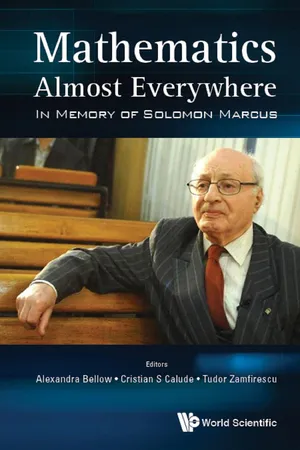
Mathematics Almost Everywhere
In Memory of Solomon Marcus
- 252 pages
- English
- ePUB (mobile friendly)
- Available on iOS & Android
Mathematics Almost Everywhere
In Memory of Solomon Marcus
About this book
-->
The book is a collection of original papers, research and surveys, dedicated to the memory of the Romanian mathematician Solomon Marcus (1925–2016). Marcus published many papers and books in mathematical analysis, theoretical computer science, mathematical linguistics, poetics, theory of literature, semiotics, and several other fields less strongly connected to mathematics, like cultural anthropology, biology, history and philosophy of science, education. He exemplified an unimaginable richness of ideas.
This volume intends to emphasize the mathematical fields in which Solomon Marcus worked, and demonstrate — as he also did — the interconnection between them. The authors who contribute to this volume are well-known experts in their fields. Most of them knew Solomon Marcus well, some even owed him for his decisive impulses for their careers and general development. With articles in so diverse areas, the volume will attract readers who would like to diversify their own knowledge or find unexpected connections with other topics.
-->
--> Contents:
- Logic, Complexity and Algebra:
- On Bases of Many-Valued Truth Functions (A Salomaa)
- Quasiperiods of Infinite Words (L Staiger)
- Early Romanian Contributions to Algebra and Polynomials (D Ştefănescu)
- Distributed Compression through the Lens of Algorithmic Information Theory: A Primer (M Zimand)
- Integrals, Operators, AF Algebras, Proof Mining and Monotone Nonexpansive Mappings:
- Monotonically Controlled Integrals (T Ball, D Preiss)
- Fine Properties of Duality Mappings (G Dincă)
- Primitive Ideal Spaces of Postliminal AF Algebras (A Lazar)
- An Application of Proof Miningto the Proximal Point Algorithm in CAT(0) Spaces (L Leuştean, A Sipoş)
- Generic Well-posedness of the Fixed Point Problem for Monotone Nonexpansive Mappings (S Reich, A J Zaslavski)
- Linguistics, Computer Science and Physics:
- Analytical Linguistics and Formal Grammars: Contributions of Solomon Marcus and Their Further Developments (M Burgin)
- A Contagious Creativity (Gh Păun)
- Entanglement through Path Identification (K Svozil)
- Solomon Marcus in Context:
- Memories about Solomon Marcus (A Bruckner)
- Memories With and About My Uncle (M Marcus)
- Index
-->
--> Readership: Graduate students and researchers. -->
Keywords:Discrete Mathematics;Mathematical Analysis;Complexity Theory;Proof Mining;Mathematical Biology;Formal Languages;Theoretical Mechanics;Mathematical Linguistics;Theoretical PhysicsReview: Key Features:
- New results in a variety of mathematical areas including operator theory, measure theory, real and functional analysis, computable algebra, formal languages, proof mining in nonlinear analysis, theoretical mechanics, mathematical logic, and topical surveys in mathematical linguistics, complexity theory and computational biology
- The authors, coming from various parts of the world, are well-known experts in the areas of their contributions
- Interconnections between results and domains will make the volume not only informative, but also attractive and unique
Frequently asked questions
- Essential is ideal for learners and professionals who enjoy exploring a wide range of subjects. Access the Essential Library with 800,000+ trusted titles and best-sellers across business, personal growth, and the humanities. Includes unlimited reading time and Standard Read Aloud voice.
- Complete: Perfect for advanced learners and researchers needing full, unrestricted access. Unlock 1.4M+ books across hundreds of subjects, including academic and specialized titles. The Complete Plan also includes advanced features like Premium Read Aloud and Research Assistant.
Please note we cannot support devices running on iOS 13 and Android 7 or earlier. Learn more about using the app.
Information
[email protected]1.1 Preliminaries





















Table of contents
- Cover page
- Title page
- Copyright
- Dedication
- Preface
- Contents
- Logic, Complexity and Algebra
- 1. On Bases of Many-Valued Truth Functions
- 2. Quasiperiods of Infinite Words
- 3. Early Romanian Contributions to Algebra and Polynomials
- 4. Distributed Compression through the Lens of Algorithmic Information Theory: A Primer
- 5. Monotonically Controlled Integrals
- 6. Fine Properties of Duality Mappings
- 7. Primitive Ideal Spaces of Postliminal AF Algebras
- 8. An Application of Proof Mining to the Proximal Point Algorithm in CAT(0) Spaces
- 9. Generic Well-posedness of the Fixed Point Problem for Monotone Nonexpansive Mappings
- 10. Analytical Linguistics and Formal Grammars: Contributions of Solomon Marcus and Their Further Developments
- 11. A Contagious Creativity
- 12. Entanglement through Path Identification
- 13. Memories about Solomon Marcus
- 14. Memories With and About My Uncle
- Index